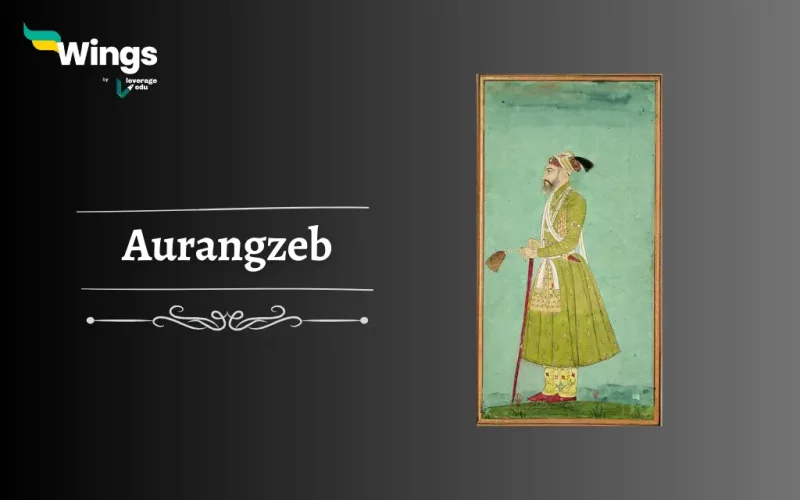Aurangzeb is often mistaken to be the last ruler of the Mughal dynasty in India. However, his reign was such that there was no influential Mughal ruler after him and history knows how India fell prey to the British after the complete downfall of the Mughal Empire. But what did Mughal Emperor Aurangzeb do that made him such a controversial and unloved figure in the dynasty of rulers known for art, benevolence, courage and resilience? Let us get to know about it through the Life and Accomplishments of Aurangzeb, the least favourite Mughal.
Table of Contents

Also Read: Ashoka: The Great Ruler of the Mauryan Empire
What was the Early Life of Aurangzeb?
Aurangzeb Alamgir was born on the 14th of October 1618 in Dahod, Gujarat. He was the beloved youngest son of Shah Jahan, the then Mughal Emperor and Mumtaz Mahal. Moreover, Aurangzeb was raised in an orthodox Muslim household and gained expertise in military as well as administrative skills.
Additionally, Aurangzeb soon took over his elder brother Dara Shikoh and led military expeditions including the ones to seize Golconda and Bijapur against Shivaji. In May 1658, he defeated his eldest brother in a Battle and got his other brothers and nephews executed.
Also Read: The Taj Mahal, an Architectural Marvel of India
What was the Reign of Aurangzeb?
Aurangzeb ruled India for 49 years, from 1658 to 1707, extending the Mughal Empire’s boundaries and practising novel orthodox practices with his subjects. It is believed that till 1680 he was a ruthless but just Monarch attending to mixed subjects (Hindus and Muslims) and using his skills for the betterment of the nation.
Moreover, Aurangzeb was successful in safeguarding his empire from Turks and defeating the Maratha king, Shivaji. He tried to use Emperor Akbar’s tactics of giving Imperial positions to enemies to have allegiances. However, Shivaji fled his capture to die as a ruler of an Independent Maratha state.
After the year 1980, his policies changed and non-muslims were imposed taxes like Jizya and Poll Tax. At the same time, his captured kingdoms were experiencing famine. The Marathas did not give up even after the death of its major leaders Shivaji and Sambhaji.
Furthermore, the Marathas guerilla warfare tactics kept Mughal Emperor Aurangzeb engaged in safeguarding his boundaries while the administration system slowly drifted beyond his control.
Also Read: Samudragupta Maurya– The Indian Napolean
How was the Economy during Aurangzeb’s Reign?
Additionally, Mughal Emperor Aurangzeb made several efforts to strengthen the economy during his reign.
- He primarily focused on agricultural developments as farming was practised by a significant part of the population. For this, Aurangzeb aimed to increase the harvest grown every year.
- Moreover, he encouraged farmers to grow cash crops like Indigo and Opium to increase the revenue of his empire. As a result, the Mughal empire witnessed an increase in trade as well as profit gained from trade.
- It was during his reign that the textile industry also saw a significant increase in growth. People started producing Muslin and Brocade which further resulted in more profit and employment.
- However, despite the profits, the Mughal Empire saw a massive drain of money resulting from expeditions and military campaigns led by Aurangzeb.
Also Read: Babur: The Magnificent History of the First Mughal Emperor
Architecture
During Aurangzeb’s reign, there was not a lot of architecture that was set up as compared to his father, Shah Jahan. Here are some of them:
- Moti Masjid in Delhi court.
- Badshahi Mosque of Lahore
- Tomb of Rabia Daurani
- Alamgir Mosque, Varanasi
- Shahi Bridge, Jaunpur

Why is Aurangzeb the Least Favorite Mughal?
Mughal Emperor Aurangzeb is a hated name in the history of India. This can be due to countless reasons:
- Firstly, he was brutal to his enemies, unjust in administration after a point in time, barbaric in approach and fought pointless battles.
- Secondly, Aurangzeb was also hated among Muslims for orthodoxy and the reason was his battles were bringing poverty and havoc among the locals.
- Thirdly, he is also known as a ruler who was not interested in art and culture and did not promote such activities in his kingdom.
- Most crucial of all, he is known to be a destroyer of many Hindu temples in India.
Aurangzeb’s actions are studied by scholars and debated by leaders even today. His rule by Sharia law in a country of mixed religions and barbaric acts also gave an easy access to the British East India Company in India. The Company made the Indian youth dream of civilized mannerisms, development, and a much more open culture.
FAQs
Aurangzeb ruled over the Indian subcontinent from 1658 to 1707. It was under his rule that the Mughal empire reached new heights and accomplishments. Moreover, this mighty ruler was known for his brutality against his enemies, controversial policies, and increased cultivation of cash crops.
Despite his many victories, Aurangzeb was defeated by numerous Indian kings in different battles. Among these, the Ahoms, Marathas, and Rajputs are the most prominent kingdoms who defeated Aurangzeb and his army. Moreover, Chhatrapati Shivaji Maharaj and Chhatrapati Sambhaji Maharaj are also included in the list.
Aurangzeb hunger for power led him to commit numerous heinous crimes. He was responsible for killing his brother Dara Shikoh and executing a nephew, a son, and two other brothers. Moreover, Aurangzeb also imprisoned his father Shah Jahan at the Agra fort.
Relevant Blogs
This was about Aurangzeb! For more interesting and informative topics on Indian History and more, stay tuned to our General Knowledge section. If you want to know more about studying abroad, reach out to our experts on Leverage Edu!
 One app for all your study abroad needs
One app for all your study abroad needs













